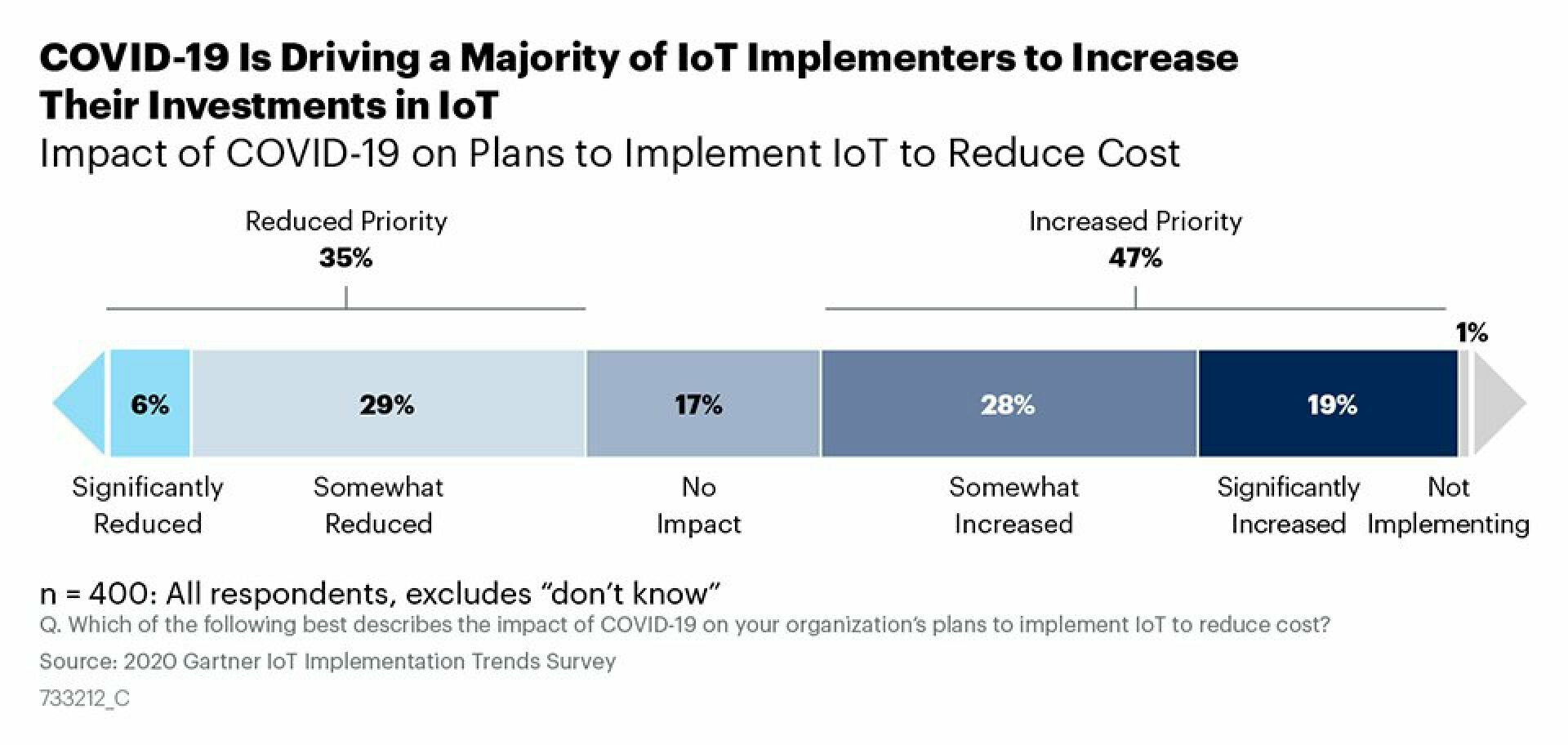10 Nov 2020 | Industry Insights
Almost half of companies to increase IoT investments despite impact of coronavirus pandemic

Research from Gartner has shown that a large number of firms are planning to invest more in implementing IoT (Internet of Things) despite the impacts felt by the coronavirus pandemic.
Survey analysis was conducted online throughout the months of June and July 2020, gathering responses from 402 participants across the UK, Germany, Australia, Singapore and the US. It discovered that 47% of businesses are planning to increase their investments in IoT, this is because they believe that implementers reap the rewards of a predictable return on investment within a specified timeframe.
Research vice-president at Gartner, Benoit Lheureux, stated that companies use KPI’s to track their business outcomes and they are specifying on average that they will make a return on investment within 3 years on average. He went on to add that because IoT investments are relatively new, there are plenty of low-hanging fruit cost-saving opportunities to go after for companies who are unsure whether it will be worth the investment, such as predictive maintenance on assets such as elevators and turbines.
A direct impact of COVID-19 has led 31% of survey respondents to reveal that they use digital twins to improve the safety of either their customers or employees, such as using remote asset monitoring to reduce the frequency of in-person monitoring. Another statistic from the survey showed that 27% of companies are planning to implement digital twins as autonomous equipment, robots or vehicles.
Lheureux said that digital twins can help companies recognise equipment failures before they stall production, leading to the ability to make repairs earlier and at less of a cost. Another use for these companies using digital twin technology is to improve scheduling, such as repairing multiple pieces of equipment in one go to minimise the impact upon operations rather than fixing pieces one at a time.
Gartner has predicted that by 2023, one-third of mid to large-sized companies will have implemented at least one digital twin associated with the motivation brought about by COVID-19.

Artificial intelligence also has a big role to play going forward, some organisations have applied AI techniques in a pragmatic manner. A quarter of the firms surveyed favoured automation through remote access and zero-touch management, helping to reduce any safety concerns. One-third of companies that have implemented IoT will also have implemented AI in conjunction with at least one IoT project.
Erik Brenneis, IoT director at Vodafone Business, said that IoT technology has made a big difference during this crisis and businesses are starting to see the benefits. It is no longer about just saving money; we need to change the way that businesses operate to provide an opportunity to re-design our operations. If companies want to be more resilient and flexible, investing in such technology is imperative.
Related insights

eBooks
Digital Twins in Higher Education Estates: A Practical Guide
Higher education institutions manage some of the most complex and diverse estates in the public sector, encompassing multi-campus environments, ageing infrastructure, specialist teaching and research facilities and high levels of daily occupancy. Effective estate management is therefore critical to supporting academic excellence, meeting sustainability commitments and maintaining financial resilience. As operational pressures increase and resources tighten, universities are increasingly exploring innovations such as digital twins to improve visibility and control across their estates.
Read more

Industry Insights
What Do Digital Twins Hold for 2026: From Visualisation to Smart Building Operations
As digital twins move from experimentation into everyday building operations, 2026 is shaping up to be a pivotal year for the sector. To explore what’s genuinely changing and what remains more hype than reality, we sat down with one of the Directors at Twinview, Neil Hancock, for a fascinating conversation on the future of digital twins and smart building operations. This interview captures an honest, practical discussion on where adoption is really happening, what operators actually need from digital twins and how the market is maturing.
Read more

Industry Insights
How Twinview Can Modernise Mine Infrastructure and Operations
Mining environments are complex, high-risk and heavily data-dependent. Managing critical infrastructure and equipment across sites requires clear, reliable operational visibility. By acting as an intelligence layer across existing systems, Twinview consolidates performance data into a single, trusted view. This enables teams to prioritise maintenance more effectively, demonstrate compliance with confidence and make operational decisions based on accurate, real-time information. In high-risk environments where downtime and failure carry significant consequences, clearer insight means reduced risk, improved performance and stronger control.
Read more

